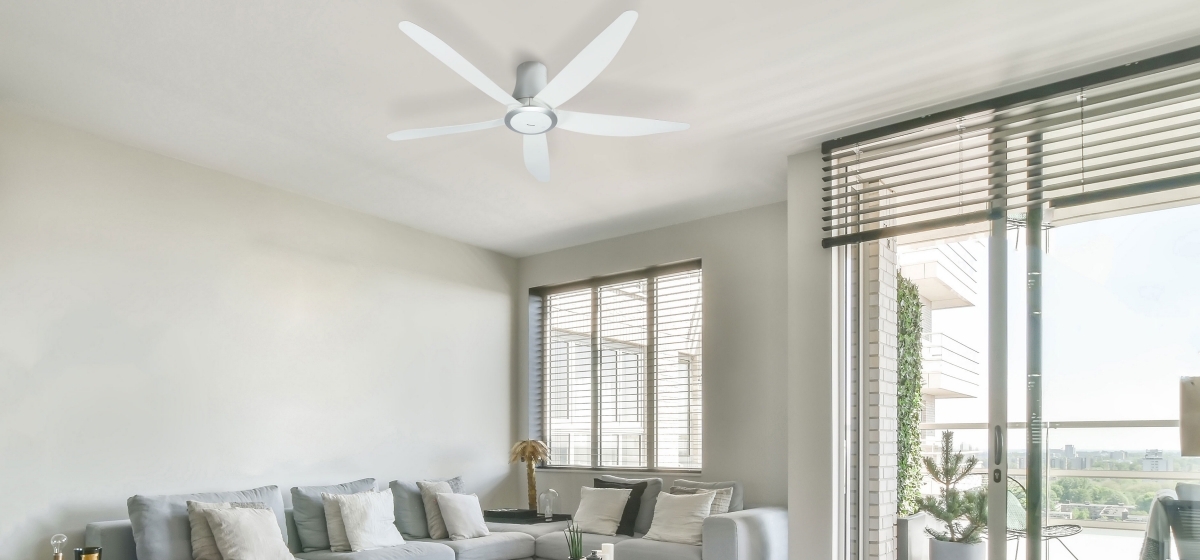60 inch 5-Blade DC Motor Ceiling Fan, Multifunction
Add to WishlistRemove from Wishlist
NO ROOM TO ADD MORE PRODUCTS
The wishlist has already reached the maximum number of products
F-60TDN
Energy-Saving DC Motor Achieving Power and Comfort
60 inch 5-blade DC motor ceiling fan. Featuring a full range of power-saving functions including various timers. Remote control for easy operation.

Please Select Your User Type

F-60TDN
Specs
Width: Ø1500mm (60”)
Height:
Short Pipe: 290mm
Long Pipe: 366mm
Air Velocity: 200 (m/min)
Air Delivery: 235 (m³/min)
• Remote Control (9-speed)
• 1-8 Hour On/Off Timer
• Sleep Mode
Colour: White
Specs
Features
Use with the Air Conditioner to Save Energy
Ceiling Fans Lower the Temperature You Feel
Ceiling fans not only circulate air and equalise the temperature in the room, but also send a gentle breeze from the ceiling, which has the effect of lower the perceived temperature. Compared with breeze and without breeze, there is a difference of approximately 3°C in the temperature you feel.

Save Energy with Air Conditioners and Ceiling Fans
Generally speaking, a temperature setting 1°C higher saves approximately 10% of the energy consumed by the air conditioner. This means that used in combination, the temperature setting of the air conditioner does not have to be lowered very much to provide a comfortable cool feeling, so leads to energy savings.

Low Power Consumption – DC Motor
The direct current (DC) motor reduces power consumption compared with alternating current (AC) motors. The result is significant energy savings for a greener environment. The DC motor is also lighter compared with conventional AC motors, allowing easier handling.

Gentle and Comfortable Breeze
These fans are equipped with 1/f yuragi function which is a fluctuating pattern to generate a gentle breeze. By this sophisticated formula, in varying air velocity and controlling wind force, these new ceiling fans give you a peaceful and comfortable feeling.

Comment after 20 Minutes Usage*
Continuous Wind
Cold : 27% Comfort : 27%
Heat release at exposed body parts More.
Heat release at exposed body parts More.
* Japan Society of Physiological Anthropology report

1/f yuragi Wind Flow
Cold : 15% Comfort : 36%
Heat release at exposed body parts Less.
Heat release at exposed body parts Less.
* Japan Society of Physiological Anthropology report

Helps to Health and Energy Savings
Sleep mode will gradually reduce fan speed until it stop by timer setting. This feature, which is great for during sleep, not only creates a healthy sleeping environment, but also enhances power saving.
*Sleep mode is disabled at fan speed-1, off-timer 1 hour setting.

LCD Remote Controller
1
On/Off Button: Press to activate or stop ceiling fan
2
Speed Button: From slow speed to cooling environment in 9 speed
3
Yuragi Button: One touch button for natural breeze
4
Sleep Mode Button: Gradually reduce fan speed according to the time setting
5
Timer Button: Press to select timer. On timer, Off timer, Release
6
Time Setting Button: Press to set time from 1 hour to 8 hour
Preventive Measures for Optimal Safety
Panasonic aim is to minimise the possibility of accidents, please carefully follow these safety measures by Panasonic, to prevent any danger due to misuse.












